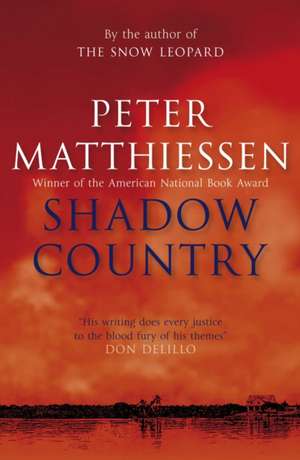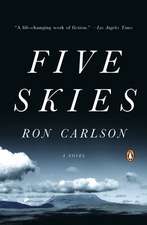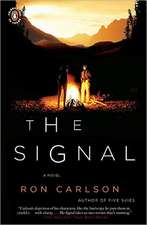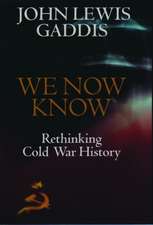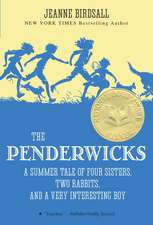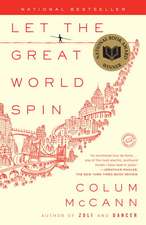Shadow Country
Autor Peter Matthiessenen Limba Engleză Paperback – 3 mar 2011
| Toate formatele și edițiile | Preț | Express |
|---|---|---|
| Paperback (2) | 86.73 lei 3-5 săpt. | +48.57 lei 6-12 zile |
| Quercus Books – 3 mar 2011 | 86.73 lei 3-5 săpt. | +48.57 lei 6-12 zile |
| Modern Library – 31 oct 2008 | 142.47 lei 3-5 săpt. |
Preț: 86.73 lei
Preț vechi: 110.54 lei
-22% Nou
Puncte Express: 130
Preț estimativ în valută:
16.60€ • 17.38$ • 13.77£
16.60€ • 17.38$ • 13.77£
Carte disponibilă
Livrare economică 20 martie-03 aprilie
Livrare express 05-11 martie pentru 58.56 lei
Preluare comenzi: 021 569.72.76
Specificații
ISBN-13: 9780857381309
ISBN-10: 085738130X
Pagini: 912
Dimensiuni: 128 x 196 x 58 mm
Greutate: 0.6 kg
Editura: Quercus Books
ISBN-10: 085738130X
Pagini: 912
Dimensiuni: 128 x 196 x 58 mm
Greutate: 0.6 kg
Editura: Quercus Books
Notă biografică
Peter Matthiessen has written eight novels, including At Play in the Fields of the Lord (nominated for the National Book Award) and Far Tortuga, and also a book of short stories, On the River Styx. His parallel career as a naturalist and environmental activist has produced numerous acclaimed works of nonfiction, most of them serialized in The New Yorker; these include The Tree Where Man Was Born (another National Book Award nominee) and The Snow Leopard (a National Book Award winner). He was elected to the American Academy of Arts and Letters in 1974.
From the Hardcover edition.
From the Hardcover edition.
Extras
ERSKINE THOMPSON
We never had no trouble from Mister Watson, and from what we seen, he never caused none, not amongst his neighbors. All his trouble come to him from the outside.
E. J. Watson turned up at Half Way Creek back in 1892, worked on the produce farms awhile, worked in the cane. Hard worker, too, but it don’t seem like he hoed cane for the money, it was more like he wanted a feel for our community. Strong, good-looking feller in his thirties, dark red hair, well made, thick through the shoulders but no fat on him, not in them days. Close to six foot and carried himself well, folks noticed him straight off and no one fooled with him. First time you seen the man you wanted him to like you—he was that kind. Wore a broad black hat and a black frock coat with big pockets, made him look bulky. Times we was cutting buttonwood with ax and hand saw, two-three cords a day—that’s hot, hard, humid work, case you ain’t done it—Ed Watson never changed that outfit. Kept that coat on over his denim coveralls, he said, cause he never knew when he might expect some company from up north. Might smile a little when he said that but never give no explanation.
Folks didn’t know where this stranger come from and nobody asked. You didn’t ask a man hard questions, not in the Ten Thousand Islands, not in them days. Folks will tell you different today, but back then there weren’t too many in our section that wasn’t on the run from someplace else. Who would come to these rain-rotted islands with not hardly enough high ground to build a outhouse, and so many miskeeters plaguing you in the bad summers you thought you’d took the wrong turn straight to Hell?
Old Man William Brown was cutting cane, and he listened to them men opining how this Watson feller was so able and so friendly. Old Man William took him a slow drink of water, give a sigh. Willie Brown said, “Well, now, Papa, is that sigh a warnin?” And his daddy said, “I feel somethin, is all. Same way I feel the damp.” They all respected Old Man William, but there weren’t one man in the cane that day that took him serious.
All the same, we noticed quick, you drawed too close to E. J. Watson, he eased out sideways like a crab, gave himself room. One time, my half-uncle Tant Jenkins come up on him letting his water, and Mister Watson come around so fast Tant Jenkins thought this feller aimed to piss on him. By the time Tant seen it weren’t his pecker he had in his hand, that gun was halfway back into them coveralls, but not so fast he could not be sure of what he seen.
Being brash as well as nervous, Tant says, “Well, now, Mister Watson! Still es-pectin company from the North?” And Watson says, very agreeable, “Any company that shows up unexpected will find me ready with a nice warm welcome.”
Ed Watson had money in his pocket when he come to Half Way Creek, which ain’t none of my business, but in all the years I knew him, right up till near the end, he always come up with money when he had to. We never knew till later he was on the dodge, but Half Way Creek was too handy to the lawmen for his liking. Ain’t nothing much out there today but a few old cisterns, but Half Way Creek had near a dozen families then, more than Everglade or Chokoloskee. Course back in them days there weren’t hardly a hundred souls in that whole hundred mile of coast south to Cape Sable.
Mister Watson weren’t at Half Way Creek but a few days when he paid cash money for William Brown’s old schooner. Ain’t many would buy a sixty-foot schooner that didn’t know nothing about boats. Time he was done, Ed Watson was one of the best boatmen on this coast.
Mister Watson and me cut buttonwood all around Bay Sunday, run it over to Key West, three dollars a cord. I seen straight off that Ed. J. Watson meant to go someplace, I seen my chance, so I signed on to guide him down around the Islands. I was just back from a year down there, plume hunting for Chevelier; I turned that Frenchman over to Bill House. We was just young fellers then, a scant fourteen. No school on Chokoloskee so you went to work.
Folks ask, “Would you have worked for Watson if you knowed about him what you know today?” Well, hell, I don’t know what I know today and they don’t neither. With so many stories growed up around that feller, who is to say which ones was true? What I seen were a able-bodied man, mostly quiet, easy in his ways, who acted according to our ideas of a gentleman. And that was all we had, ideas, cause we had never seen one in this section, unless you would count Preacher Gatewood, who brought the Lord to Everglade back in 1888 and took Him away again when he departed, the men said. Some kind of a joke, wouldn’t surprise me.
Most of our old Glades pioneers was drifters and deserters from the War Between the States who never got the word that we was licked. Moonshiners and plume hunters, the most of ’em. Thatch lean-tos and a skiff and pot and rifle, maybe a jug of homemade lightning for fighting off the skeeters in the evening. Had earth in a tub, made their fire in the skiff, had coffee going morning, noon, and night.
Man on the run who used the name Will Raymond was camped with a woman and her daughter in a palmetta shack on that big bend in Chatham River, living along on grits and mullet, taking some gator hides and egret plumes, selling bad moonshine to the Injuns. We seen plenty like Will Raymond in the Islands, knife-mouthed piney-woods crackers, hollow-eyed under wool hats, and them bony-cheeked tall women with lank black hair like horse mane. Go crazy every little while, shoot some feller through the heart. Will done that more’n once in other parts, we heard, and got that habit. Seems the law wanted him bad—dead or alive, as you might say. When deputies come a-hunting him out of Key West, Will said nosir, he’d be damned if he’d go peaceable, and he whistled a bullet past their heads to prove it, but he was peaceable as the law allows by the time the smoke cleared. The law invited the Widder Raymond to accompany his mangy carcass on a free boat ride to Key West, and she said, “Thankee, boys, I don’t mind if I do.”
Old Man Richard Harden, then the Frenchman, was on Chatham Bend before him, and the Injuns before that; biggest Injun mound south of Chokoloskee Island. Most of the Bend was overgrowed cause none of ’em weren’t farmers, and Mister Watson would cuss Will Raymond every time we went downriver, saying how pitiful it was to see that good ground going to waste. One day Mister Watson went ashore, made an offer for the quit-claim, and Raymond come out with a old musket, run him off. Fortnight later, a posse come a hundred mile north from Key West and killed that pesky feller, and next thing you know, Ed Watson tracked the widder down and bought the quit-claim, two hundred fifty dollars. That was a pile of cash in them days, but what he got was forty acres of good soil, protected on three sides by mangrove tangle: anybody who come huntin E. J. Watson would have to come straight at him, off the river.
E. J. Watson had grand plans, about the only feller down there as ever did. Used to talk about dredging out the mouth of Chatham River, make a harbor for that wild southwest coast. Meantime, he sunk buttonwood posts to frame up a new cabin, had wood shutters and canvas flaps on the front windows, brought in a woodstove and a kerosene lamp and a galvanized tub for anyone might care to bath. We ate good, too, fish and wild meat, sowbelly and grits, had a big iron skillet and made johnnycakes: put some lard to his good flour, cooked ’em up dry. I remembered them big johnnycakes all my whole life.
Will Raymond’s shack weren’t fit for hogs, Mister Watson said, had to patch it up before he put his hogs in it. We had two cows, and chickens, too, but that man had a real feel for hogs. He loved hogs and hogs loved him, come to his call from all over the Bend, I can hear him calling down them river evenings to this day. Brought ’em in at night cause of the panthers, fed ’em garden trash and table slops and such so they wouldn’t get no fishy taste like them old razorbacks at Hardens that fed on crabs and lowlife when the tide was out. Kept a old roan horse to pull his plow, break that hard shell ground, and sometimes he’d ride around his farm like it was his old family plantation back in South Carolina.
Mister Watson experimented with all kinds of vegetables and tobacco. Only victuals we traded for was salt and coffee: bought hard green coffee beans, wrapped ’em in burlap. hammered ’em to powder with a mallet. Made our own grits and sugar and cane spirits—what we called white lightning. Seasons when vegetables done poor, we’d pole inland up the creeks and out across the Glades to the piney ridges, get Injun greens and coontie root for starch and flour, cut some cabbage-palm tops in the hammocks. Worked his crew like niggers and worked like a nigger alongside of us. Brung in regular niggers from Fort Myers, and they worked hard, too—that man knew how to get work from his help! Them boys was scared to death of him, he could be rough. But they sure liked to listen to his stories, least when he weren’t drinking. Told ’em nigger jokes that set ’em giggling for hours—nerves, maybe. I never did get them fool jokes. Me’n niggers just don’t think the same.
Ed Watson was the first man since the Injuns to hack down all that thorn on Chatham Bend. Dug out palmetta roots thick as his leg, raked the shell out of that black soil and made a farm. Grew all kinds of vegetables, grew cane for syrup, and tomatoes and then alligator pears. Chok folks hooted when he tried seed potatoes, but Mister Watson shipped them things for three-four years and almost made ’em pay, and never failed to raise a few for our own table.
We got good money for our produce but too much spoiled before it reached Key West, so pretty quick, we give up on common vegetables and stuck to sugarcane. Next he figured that making cane syrup right there on the Bend made a lot more sense than shipping heavy stalks, because syrup could be stored till he got his price. First planter in south Florida to let his cane tassel before harvest so the syrup would boil down stronger without sugaring. Burned off his field before harvest, too, figuring the work would go much faster once the leaves and cane tops was burned away: nothing but clean stalks to deal with, not much sugar lost, and a smaller crew. And he learned not to wait too long: he’s the one discovered that cane sugar don’t extract good from the stalks even a few days after the burn.
Locally we sold every jar of syrup we produced so we invested in a bigger schooner that he called the Gladiator, packed our syrup in screw-top gallon cans, six to the case, shipped ’em to Port Tampa and Key West. Island Pride! Our brand grew to be famous. Them fellers at Half Way Creek and Turner River made good syrup but our Island Pride had left ’em in the dust.
All this while we shot gators and egrets when they was handy. Up them inland creeks past Alligator Bay, white egrets was thick, pink curlew, too, and we never failed to take a deer for venison, sometimes a turkey. Trapped coons and otters, shot a bear or panther every little while. Mister Watson was a deadeye shot. I could shoot pretty good, too, but the only man in southwest Florida could shoot as quick and clean as E. J. Watson was Nigger Short.
When D. D. House moved his cane plantation from Half Way Creek down to a big hammock north of Chatham Bend, he took Short with him. Sundays, that boy might visit with Bill House at Possum Key or go to Hardens. Henry and me got on all right, I never held nothin against him, but them damn Hardens let that nigger eat right at their table.
Besides me and Mister Watson, the only man hunting plume birds in our section was the Frenchman. One day we seen Chevelier’s skiff come out Sim’s Creek that’s back of Gopher Key. Sometimes that old man had Injuns with him, and this day I seen a dugout slide out of sight into the greenery.
Mister Watson never paid them Injuns no attention, only the skiff; he made me a sign to ship my oars, drift quiet. When Chevelier lifted his straw hat to mop his head, he shot it right out of his hand, just spun it away into the water. That old man yelped and grabbed his oars and skedaddled like a duck into the mangroves. “Stay off my territory!” shouts Watson. Picking up the floating hat with that new hole in it, he was grinning, kind of sheepish. Never a whisper from the mangroves and nothing to be seen but them red stilt roots, water glitter, and green air. “You’ll find your hat at Chatham Bend!” he yells.
I told Mister Watson how Chevelier was collecting rare birds for museums, used small-gauge bird shot so as not to spoil the skins. The Frenchman had all kinds of books, knew all about Injuns, spoke some of their lingo; he had wild men visiting at Possum Key that would never go nowhere near Chokoloskee Bay. Traded their hides and furs through Richard Harden, who claimed to be Choctaw or some such, though nobody never paid that no attention. The Frenchman was always close to Hardens, and probably it was Old Man Richard who brought them Injuns to him in the first place.
All the while I was talking, Mister Watson watched me. That feller would look at you dead on for a long minute, then blink just once, real slow, like a chewing turtle, keeping his eyes closed for a moment as if resting ’em up from such a dretful sight. That’s how I first noticed his fire color, that dark red hair the color of old embers or dried blood, and the ruddy skin and sunburned whiskers with a little gold to ’em, like he glowed inside. Then them blue eyes fixed me again, out of the shadow of that black felt hat. Only hat in the Ten Thousand Islands, I imagine, that had a label into it from Fort Smith, Arkansas. I took to whistling.
“What’s he up to over yonder, then?” Mister Watson interrupts me. I told him about that Injun mound hid away on Gopher Key and the white shell lining the canal that come in there from the Gulf. My opinion, Chevelier was hunting Calusa treasure.
On the way home, he was quiet. Finally he said he wouldn’t mind having him a chat with a educated man like Jean Chevelier—Che-vell-yay, he called him, stead of Shovel-leer, the way us local fellers said it—and he reckoned he’d picked a piss-poor way to get acquainted. He was right. That old Frenchman had some sand or he wouldn’t have made it all alone here in the Islands. This hat business weren’t over by a long shot.
We hung that felt hat on a peg when we got home but the Frenchman never come for it. After that day, we had them plume birds to ourselves.
From the Hardcover edition.
We never had no trouble from Mister Watson, and from what we seen, he never caused none, not amongst his neighbors. All his trouble come to him from the outside.
E. J. Watson turned up at Half Way Creek back in 1892, worked on the produce farms awhile, worked in the cane. Hard worker, too, but it don’t seem like he hoed cane for the money, it was more like he wanted a feel for our community. Strong, good-looking feller in his thirties, dark red hair, well made, thick through the shoulders but no fat on him, not in them days. Close to six foot and carried himself well, folks noticed him straight off and no one fooled with him. First time you seen the man you wanted him to like you—he was that kind. Wore a broad black hat and a black frock coat with big pockets, made him look bulky. Times we was cutting buttonwood with ax and hand saw, two-three cords a day—that’s hot, hard, humid work, case you ain’t done it—Ed Watson never changed that outfit. Kept that coat on over his denim coveralls, he said, cause he never knew when he might expect some company from up north. Might smile a little when he said that but never give no explanation.
Folks didn’t know where this stranger come from and nobody asked. You didn’t ask a man hard questions, not in the Ten Thousand Islands, not in them days. Folks will tell you different today, but back then there weren’t too many in our section that wasn’t on the run from someplace else. Who would come to these rain-rotted islands with not hardly enough high ground to build a outhouse, and so many miskeeters plaguing you in the bad summers you thought you’d took the wrong turn straight to Hell?
Old Man William Brown was cutting cane, and he listened to them men opining how this Watson feller was so able and so friendly. Old Man William took him a slow drink of water, give a sigh. Willie Brown said, “Well, now, Papa, is that sigh a warnin?” And his daddy said, “I feel somethin, is all. Same way I feel the damp.” They all respected Old Man William, but there weren’t one man in the cane that day that took him serious.
All the same, we noticed quick, you drawed too close to E. J. Watson, he eased out sideways like a crab, gave himself room. One time, my half-uncle Tant Jenkins come up on him letting his water, and Mister Watson come around so fast Tant Jenkins thought this feller aimed to piss on him. By the time Tant seen it weren’t his pecker he had in his hand, that gun was halfway back into them coveralls, but not so fast he could not be sure of what he seen.
Being brash as well as nervous, Tant says, “Well, now, Mister Watson! Still es-pectin company from the North?” And Watson says, very agreeable, “Any company that shows up unexpected will find me ready with a nice warm welcome.”
Ed Watson had money in his pocket when he come to Half Way Creek, which ain’t none of my business, but in all the years I knew him, right up till near the end, he always come up with money when he had to. We never knew till later he was on the dodge, but Half Way Creek was too handy to the lawmen for his liking. Ain’t nothing much out there today but a few old cisterns, but Half Way Creek had near a dozen families then, more than Everglade or Chokoloskee. Course back in them days there weren’t hardly a hundred souls in that whole hundred mile of coast south to Cape Sable.
Mister Watson weren’t at Half Way Creek but a few days when he paid cash money for William Brown’s old schooner. Ain’t many would buy a sixty-foot schooner that didn’t know nothing about boats. Time he was done, Ed Watson was one of the best boatmen on this coast.
Mister Watson and me cut buttonwood all around Bay Sunday, run it over to Key West, three dollars a cord. I seen straight off that Ed. J. Watson meant to go someplace, I seen my chance, so I signed on to guide him down around the Islands. I was just back from a year down there, plume hunting for Chevelier; I turned that Frenchman over to Bill House. We was just young fellers then, a scant fourteen. No school on Chokoloskee so you went to work.
Folks ask, “Would you have worked for Watson if you knowed about him what you know today?” Well, hell, I don’t know what I know today and they don’t neither. With so many stories growed up around that feller, who is to say which ones was true? What I seen were a able-bodied man, mostly quiet, easy in his ways, who acted according to our ideas of a gentleman. And that was all we had, ideas, cause we had never seen one in this section, unless you would count Preacher Gatewood, who brought the Lord to Everglade back in 1888 and took Him away again when he departed, the men said. Some kind of a joke, wouldn’t surprise me.
Most of our old Glades pioneers was drifters and deserters from the War Between the States who never got the word that we was licked. Moonshiners and plume hunters, the most of ’em. Thatch lean-tos and a skiff and pot and rifle, maybe a jug of homemade lightning for fighting off the skeeters in the evening. Had earth in a tub, made their fire in the skiff, had coffee going morning, noon, and night.
Man on the run who used the name Will Raymond was camped with a woman and her daughter in a palmetta shack on that big bend in Chatham River, living along on grits and mullet, taking some gator hides and egret plumes, selling bad moonshine to the Injuns. We seen plenty like Will Raymond in the Islands, knife-mouthed piney-woods crackers, hollow-eyed under wool hats, and them bony-cheeked tall women with lank black hair like horse mane. Go crazy every little while, shoot some feller through the heart. Will done that more’n once in other parts, we heard, and got that habit. Seems the law wanted him bad—dead or alive, as you might say. When deputies come a-hunting him out of Key West, Will said nosir, he’d be damned if he’d go peaceable, and he whistled a bullet past their heads to prove it, but he was peaceable as the law allows by the time the smoke cleared. The law invited the Widder Raymond to accompany his mangy carcass on a free boat ride to Key West, and she said, “Thankee, boys, I don’t mind if I do.”
Old Man Richard Harden, then the Frenchman, was on Chatham Bend before him, and the Injuns before that; biggest Injun mound south of Chokoloskee Island. Most of the Bend was overgrowed cause none of ’em weren’t farmers, and Mister Watson would cuss Will Raymond every time we went downriver, saying how pitiful it was to see that good ground going to waste. One day Mister Watson went ashore, made an offer for the quit-claim, and Raymond come out with a old musket, run him off. Fortnight later, a posse come a hundred mile north from Key West and killed that pesky feller, and next thing you know, Ed Watson tracked the widder down and bought the quit-claim, two hundred fifty dollars. That was a pile of cash in them days, but what he got was forty acres of good soil, protected on three sides by mangrove tangle: anybody who come huntin E. J. Watson would have to come straight at him, off the river.
E. J. Watson had grand plans, about the only feller down there as ever did. Used to talk about dredging out the mouth of Chatham River, make a harbor for that wild southwest coast. Meantime, he sunk buttonwood posts to frame up a new cabin, had wood shutters and canvas flaps on the front windows, brought in a woodstove and a kerosene lamp and a galvanized tub for anyone might care to bath. We ate good, too, fish and wild meat, sowbelly and grits, had a big iron skillet and made johnnycakes: put some lard to his good flour, cooked ’em up dry. I remembered them big johnnycakes all my whole life.
Will Raymond’s shack weren’t fit for hogs, Mister Watson said, had to patch it up before he put his hogs in it. We had two cows, and chickens, too, but that man had a real feel for hogs. He loved hogs and hogs loved him, come to his call from all over the Bend, I can hear him calling down them river evenings to this day. Brought ’em in at night cause of the panthers, fed ’em garden trash and table slops and such so they wouldn’t get no fishy taste like them old razorbacks at Hardens that fed on crabs and lowlife when the tide was out. Kept a old roan horse to pull his plow, break that hard shell ground, and sometimes he’d ride around his farm like it was his old family plantation back in South Carolina.
Mister Watson experimented with all kinds of vegetables and tobacco. Only victuals we traded for was salt and coffee: bought hard green coffee beans, wrapped ’em in burlap. hammered ’em to powder with a mallet. Made our own grits and sugar and cane spirits—what we called white lightning. Seasons when vegetables done poor, we’d pole inland up the creeks and out across the Glades to the piney ridges, get Injun greens and coontie root for starch and flour, cut some cabbage-palm tops in the hammocks. Worked his crew like niggers and worked like a nigger alongside of us. Brung in regular niggers from Fort Myers, and they worked hard, too—that man knew how to get work from his help! Them boys was scared to death of him, he could be rough. But they sure liked to listen to his stories, least when he weren’t drinking. Told ’em nigger jokes that set ’em giggling for hours—nerves, maybe. I never did get them fool jokes. Me’n niggers just don’t think the same.
Ed Watson was the first man since the Injuns to hack down all that thorn on Chatham Bend. Dug out palmetta roots thick as his leg, raked the shell out of that black soil and made a farm. Grew all kinds of vegetables, grew cane for syrup, and tomatoes and then alligator pears. Chok folks hooted when he tried seed potatoes, but Mister Watson shipped them things for three-four years and almost made ’em pay, and never failed to raise a few for our own table.
We got good money for our produce but too much spoiled before it reached Key West, so pretty quick, we give up on common vegetables and stuck to sugarcane. Next he figured that making cane syrup right there on the Bend made a lot more sense than shipping heavy stalks, because syrup could be stored till he got his price. First planter in south Florida to let his cane tassel before harvest so the syrup would boil down stronger without sugaring. Burned off his field before harvest, too, figuring the work would go much faster once the leaves and cane tops was burned away: nothing but clean stalks to deal with, not much sugar lost, and a smaller crew. And he learned not to wait too long: he’s the one discovered that cane sugar don’t extract good from the stalks even a few days after the burn.
Locally we sold every jar of syrup we produced so we invested in a bigger schooner that he called the Gladiator, packed our syrup in screw-top gallon cans, six to the case, shipped ’em to Port Tampa and Key West. Island Pride! Our brand grew to be famous. Them fellers at Half Way Creek and Turner River made good syrup but our Island Pride had left ’em in the dust.
All this while we shot gators and egrets when they was handy. Up them inland creeks past Alligator Bay, white egrets was thick, pink curlew, too, and we never failed to take a deer for venison, sometimes a turkey. Trapped coons and otters, shot a bear or panther every little while. Mister Watson was a deadeye shot. I could shoot pretty good, too, but the only man in southwest Florida could shoot as quick and clean as E. J. Watson was Nigger Short.
When D. D. House moved his cane plantation from Half Way Creek down to a big hammock north of Chatham Bend, he took Short with him. Sundays, that boy might visit with Bill House at Possum Key or go to Hardens. Henry and me got on all right, I never held nothin against him, but them damn Hardens let that nigger eat right at their table.
Besides me and Mister Watson, the only man hunting plume birds in our section was the Frenchman. One day we seen Chevelier’s skiff come out Sim’s Creek that’s back of Gopher Key. Sometimes that old man had Injuns with him, and this day I seen a dugout slide out of sight into the greenery.
Mister Watson never paid them Injuns no attention, only the skiff; he made me a sign to ship my oars, drift quiet. When Chevelier lifted his straw hat to mop his head, he shot it right out of his hand, just spun it away into the water. That old man yelped and grabbed his oars and skedaddled like a duck into the mangroves. “Stay off my territory!” shouts Watson. Picking up the floating hat with that new hole in it, he was grinning, kind of sheepish. Never a whisper from the mangroves and nothing to be seen but them red stilt roots, water glitter, and green air. “You’ll find your hat at Chatham Bend!” he yells.
I told Mister Watson how Chevelier was collecting rare birds for museums, used small-gauge bird shot so as not to spoil the skins. The Frenchman had all kinds of books, knew all about Injuns, spoke some of their lingo; he had wild men visiting at Possum Key that would never go nowhere near Chokoloskee Bay. Traded their hides and furs through Richard Harden, who claimed to be Choctaw or some such, though nobody never paid that no attention. The Frenchman was always close to Hardens, and probably it was Old Man Richard who brought them Injuns to him in the first place.
All the while I was talking, Mister Watson watched me. That feller would look at you dead on for a long minute, then blink just once, real slow, like a chewing turtle, keeping his eyes closed for a moment as if resting ’em up from such a dretful sight. That’s how I first noticed his fire color, that dark red hair the color of old embers or dried blood, and the ruddy skin and sunburned whiskers with a little gold to ’em, like he glowed inside. Then them blue eyes fixed me again, out of the shadow of that black felt hat. Only hat in the Ten Thousand Islands, I imagine, that had a label into it from Fort Smith, Arkansas. I took to whistling.
“What’s he up to over yonder, then?” Mister Watson interrupts me. I told him about that Injun mound hid away on Gopher Key and the white shell lining the canal that come in there from the Gulf. My opinion, Chevelier was hunting Calusa treasure.
On the way home, he was quiet. Finally he said he wouldn’t mind having him a chat with a educated man like Jean Chevelier—Che-vell-yay, he called him, stead of Shovel-leer, the way us local fellers said it—and he reckoned he’d picked a piss-poor way to get acquainted. He was right. That old Frenchman had some sand or he wouldn’t have made it all alone here in the Islands. This hat business weren’t over by a long shot.
We hung that felt hat on a peg when we got home but the Frenchman never come for it. After that day, we had them plume birds to ourselves.
From the Hardcover edition.
